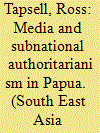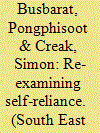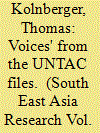|
|
|
Sort Order |
|
|
|
Items / Page
|
|
|
|
|
|
|
| Srl | Item |
| 1 |
ID:
141737


|
|
|
|
|
| Summary/Abstract |
In recent years, financial cooperation within ASEAN Plus Three (APT) has made significant progress. It has covered bond market development, better access to financing, financial stabilization and capital market harmonization, and several initiatives have resulted in concrete programmes being implemented by the APT member countries (ASEAN states, China, South Korea and Japan). In the context of the changes taking place in the regional dynamic, this paper examines the role and involvement of Indonesian financial authorities towards the development of APT financial regionalism, focusing on issues related to regional liquidity arrangements and regional bond markets. The initial findings indicate that, in considering the potential benefits of warding off future economic shocks, there is a strong intention among Indonesian financial authorities to create a space in their national framework for regional liquidity arrangements. However, the authorities are unenthusiastic about the progress of regional governance on bond markets and, for that reason, are disinclined to transform their national regulatory space as it potentially hampers the Indonesian domestic market.
|
|
|
|
|
|
|
|
|
|
|
|
|
|
|
|
| 2 |
ID:
141743


|
|
|
|
|
| Summary/Abstract |
China is the largest foreign investor in Cambodia's energy sector where its multi-million-dollar investment is transforming the country's energy sector, helping to reduce reliance on foreign energy, increase the electrification rate and potentially reduce energy costs. However, Chinese-funded energy projects, particularly hydropower dams, have encountered widespread suspicion and harsh criticism for failing to meet international standards and for imposing social and environmental damage. Combining site visits, in-depth interviews and comprehensive desk research, this paper examines Cambodia's energy challenges and critically analyses China's controversial role in the energy sector using a sustainable development framework. The paper provides significant insight into the link between energy and sustainable development, and directly contributes to the formation of a sustainable energy policy for Cambodia.
|
|
|
|
|
|
|
|
|
|
|
|
|
|
|
|
| 3 |
ID:
141738


|
|
|
|
|
| Summary/Abstract |
By exploring the sources of authority, the characteristics, the sociopolitical world, the roles and the relationships between village leaders, this paper shows that there have been only a few changes in local politics in western Madura, Indonesia, since the 1998 political reformation. In fact, despite the continual reformation processes, the circumstances of local politics in that area have remained relatively similar and have actually been characterized by continuity. There, local politics has been an arena of typical local leaders: the klebun (village heads), the kiai (religious leaders) and the blater (local strongmen). The struggle for influence within these village elites is centred not only on opportunities for private material benefits, but also on political competition, which is loosely organized, pragmatic and often mutually beneficial in nature. These village elites' continuous presence in the post-Suharto period is without doubt a reflection and a consequence of their constant influence over society.
|
|
|
|
|
|
|
|
|
|
|
|
|
|
|
|
| 4 |
ID:
141739


|
|
|
|
|
| Summary/Abstract |
This article examines the hindrances to journalists' autonomy in the Papua provinces of Indonesia. It argues that media practitioners in Papua are operating in a subnational authoritarian environment, where the freedoms enjoyed by journalists elsewhere in Indonesia's largely robust media are not afforded to local journalists. The article explains that security forces and local government are the main factors influencing mainstream news content in the region. Yet, as Internet penetration rises and new communication technologies are advanced, new online journalism ventures are gaining in prominence. Their success will depend on whether subnational authoritarianism remains the status quo in a region where new local media ventures are largely unable to provide open and critical coverage of events and issues.
|
|
|
|
|
|
|
|
|
|
|
|
|
|
|
|
| 5 |
ID:
141740


|
|
|
|
|
| Summary/Abstract |
Self-reliance sprang to prominence in Thailand in the 1980s in response to the socioeconomic upheavals of development, globalization and rural transformation. Whereas debates over self-reliance have tended to be polemical, with scholars critiquing its idealistic, nationalist and anti-market features, this article considers the divergent meanings of self-reliance. Redirecting attention from a collective idea of the 'self' based on motifs of the self-sufficient village and nation, to individual self-making, the authors argue that self-reliance can equally refer to an entrepreneurial ethic of maximizing one's potential under conditions of rapid rural transformation through active and pragmatic engagement with the market and the state. After introducing the collective and individual faces of self-reliance, the article presents a content analysis of Theknoloyi Chaoban (Villager Technology), a magazine founded in the late 1980s to promote self-reliance among farmers. As a repository of practical handbook knowledge, the magazine encourages village self-sufficiency and national self-sourcing alongside commercial and state-based strategies for boosting productivity, thus illuminating the complex realities of rural transformation and self-making in Thailand since the 1980s.
|
|
|
|
|
|
|
|
|
|
|
|
|
|
|
|
| 6 |
ID:
141744


|
|
|
|
|
| Summary/Abstract |
This paper examines how specific historical narratives of the Philippines are remembered in the domain of popular music. Using popular songs written by Filipino folk pop singer Yoyoy Villame about the discovery of the Philippines by Ferdinand Magellan in 1521, it analyses the lyrics of 'Magellan' (1972) and 'Diklamasyon' (1999) as cultural text and interprets them in the light of concepts from literature, language and history. Using Benedict Anderson's (1983) 'imagined communities', the study puts forward two ways of remembering the nation's history – the textbook and folk tradition. It shows that satire, facilitated through parody, burlesque, irony and code-switching as rhetorical devices, is a mode for remembering the nation.
|
|
|
|
|
|
|
|
|
|
|
|
|
|
|
|
| 7 |
ID:
141741


|
|
|
|
|
| Summary/Abstract |
Appropriate personal conduct has long been intrinsic to notions of Thai national identity. Thailand has an especially large corpus of didactic works on proper manners. Formerly, one of the major sources of ideas about bodily comportment was Theravada Buddhism. From the late nineteenth century, however, another genre of literature on manners began to appear, written to instruct students in the newly established modern education system about the personal qualities necessary for a career in the expanding royal bureaucracy. This article examines the most famous of these didactic texts, Qualities of a Gentleman, written by the prominent educational reformer Chaophraya Phrasadet Surentharathibodi (1867–1916). Largely as a result of this work, the royal official became the new exemplar of proper social behaviour in Thai society. With the conservative political turn and the restoration of the monarchy in the late 1950s, the work was revived, and the social etiquette it taught was reproduced as the model not only for government officials, but for Thai citizens generally.
|
|
|
|
|
|
|
|
|
|
|
|
|
|
|
|
| 8 |
ID:
141742


|
|
|
|
|
| Summary/Abstract |
During the 1980s, refugee camps along the Thai–Cambodian border constituted the power base for the civil war parties opposing the People's Republic of Kampuchea (PRK, 1979–91). Politics of accommodation and basic services also played a key role in the 'original accumulation' of political power by the new regime in Phnom Penh. The resettlement process of Cambodia's deserted cities developed into a major playground for clientelism, the foundation of Cambodia's state-building process after the Khmer Rouge. Focusing on the archival heritage of the United Nations Transitional Authority in Cambodia (UNTAC) 1992–93, a spatial analysis of Phnom Penh's political geography from the late 1970s to the late 1990s will be provided. This paper argues that the UNTAC time marked a watershed, whose impact has been underrated for Cambodia's political future: the transition in the accommodation policy of a besieged regime. UNTAC did not end the civil war, but changed the political economy of the country. As the need to 'camp-in' and share billeted living space gradually diminished, the socialist 'moral economy' mutated into quick money politics and political family business to ensure the hegemonic status of Cambodia's ruling party further.
|
|
|
|
|
|
|
|
|
|
|
|
|
|
|
|
|
|
|
|
|